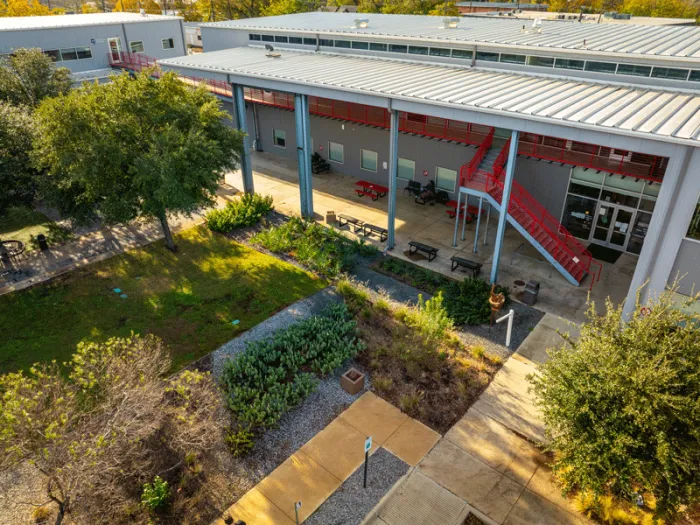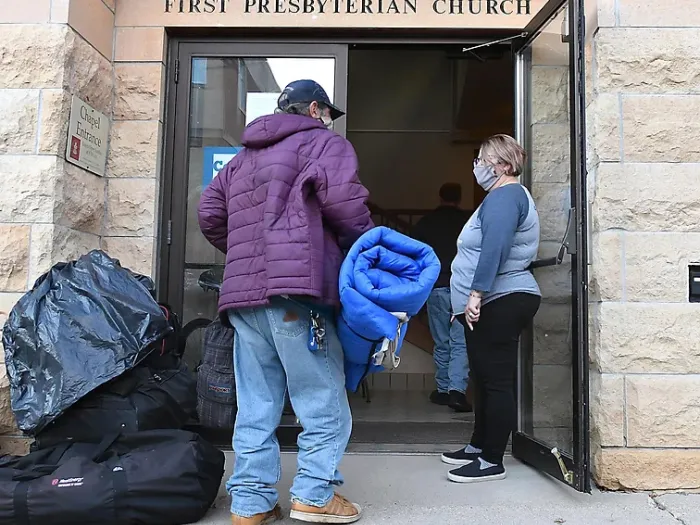Hundreds turn out for ‘Evicting the American Dream’ premiere
Speakers discuss ways you can mobilize to address eviction and homelessness

DAYTON, OHIO — Though “Evicting the American Dream” was filmed in Dayton, Ohio, documentary co-producer Dr. Katherine Rowell is quick to point out that it’s not just a local story.
“The issues in this film you're going to see are across the country,” Rowell explained to a packed house at the March 30 premiere. “But I'm really thankful for the citizens and organizers and activists in our city who came forward to tell the story.”

Rowell, a sociology professor at Sinclair Community College, was addressing more than 350 people who’d gathered in the campus auditorium to see the documentary, which delves into systemic issues and insidious practices that can lead to families being forced out of their homes and into unsafe, substandard housing, or even homeless shelters.
“There's a dominant narrative out there that says there is nothing we can do to prevent homelessness,” Director David Barnhart told the crowd. But there are “counter stories that say, ‘Oh yes, we can.’ There are so many things that we can be doing differently, systemically, policy-wise, to stop this epidemic and to prevent it from happening.”
Attendees at the premiere included John Zimmerman, vice president of the Miami Valley Fair Housing Center, which engages in activities designed to encourage fair housing practices.
Viewing the film is important, Zimmerman said, because “people who are evicted should have the same rights as everyone else in this country, and they should have the right to counsel, and 97% of the people in the United States that are evicted don't have that right, and that is essentially saying we have forgotten your children.”
“Evicting the American Dream” is an educational resource of Counter Stories Productions, the story ministry of Presbyterian Disaster Assistance, that captures the trauma and innocence of children living in a shelter.
“When you look at any of the research on the adverse childhood experiences, housing instability is one of the top experiences that can cause that ongoing trauma, and we know that trauma, then, is not just part of our mental experience moving forward but can affect our educational outcomes, our health outcomes, all types of outcomes as we age,” said Amy Riegel, executive director of the Coalition on Homeless and Housing in Ohio.
The children’s testimonies appear after research and interviews with community partners and experts like Riegel, who explain forces that make it hard for their families to keep their housing and how the dream of American homeownership is being sapped by corporate priorities.

This film is “about the reality we are living as a society, a growing crisis of displacement, of families being forced out of their very communities that they helped build, of neighbors turned into numbers in the system and courts and dreams that are being deferred by rising costs, broken systems and institutional neglect,” said the Rev. Edwin González-Castillo, director of PDA, at the premiere.
Breaking the cycle is important because “what we know is that children who are homeless, unfortunately (often) grow up to be adults who experience homelessness,” Riegel said. “I think the movie outlines how we might be able to break that cycle and change the system, so they have a different outcome in 20 years.”
The documentary was followed by a panel discussion featuring experts and community partners. Joining Rowell and Barnhart were Debra Lavey, an attorney for Advocates for Basic Legal Equality (ABLE); Destiny Brown, a community organizer for ABLE and Dayton Tenant Union; Riegel and Zimmerman.
The panel discussed ongoing challenges, such as the uncertainty of retaining federal funding for groups that serve tenants who face housing discrimination and other woes, but also about some progress that has been made since the documentary was filmed.
Lavey highlighted the fact that people in Dayton can now request for their eviction record to be sealed instead of it following them like a scarlet letter ‘E.’ She also highlighted the Access to Counsel pilot program that was launched last year for people living in particular ZIP codes where there’s been disinvestment.

Brown said she is excited to see more collaboration among groups working on community issues and that tenants are becoming more knowledgeable.
“Residents have been able to develop an education platform that is traveling around the county to inform tenants of their rights, and it has really broken down some of the walls and barriers,” she said. “A lot of times, property owners assume that they are dealing with someone uneducated, and if you just empower that person, say, ‘Hey, just write this letter to them and say this,’ it sometimes alleviates the issues that they're having.”
Brown also recommended that people use their privilege to make a difference.
“You have people who feel compelled and compassionate about protesting, versus writing a letter, versus organizing a group of people to speak out about it, but whatever that looks like, it is those collective voices — that are not all Black and brown voices — ” that are imperative for people to hear, Brown said.
Zimmerman suggested supporting the McKinney-Vento program of the Dayton Public Schools to benefit kids experiencing homelessness. “Many of them don't go to shelters because they don't want to be on the shelter bus,” he said. “They live in their cars. They live under bridges. They circulate among their aunties and go to different places … and that program at the Dayton Public Schools is always in need of resources.”
Riegel recommended looking for ways to increase opportunities for children to excel, not only near you but in other neighborhoods. “What we are doing, oftentimes in many communities, is that we are keeping opportunity in zip codes and not offering it to others, so how do we open that up?”
For more information about the documentary, go to pcusa.org/evicting. If you’re interested in hosting a screening of the film, contact PDA's Michelle Muñiz at michelle.muniz@pcusa.org.
You may freely reuse and distribute this article in its entirety for non-commercial purposes in any medium. Please include author attribution, photography credits, and a link to the original article. This work is licensed under a Creative Commons Attribution-NonCommercial-NoDeratives 4.0 International License.




